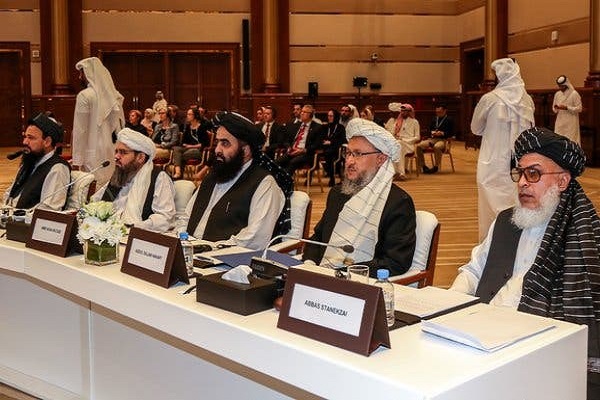Alwaght- Recently, media reported an initial agreement between Afghanistan government and the Taliban group on the framework of peace talks.
Reports also suggested that delegations from two sides in the Qatari capital Doha have agreed to continue the peace negotiations.
Sediq Sediqi, Afghanistan presidential spokesman, in a Twitter post talked about President Ashraf Ghani’s welcome of the finalization of the Doha dialogue framework, adding that the agreement on the structure for the talks was a step forward, a popular demand, and a path to secure ceasefire and sustainable peace in the war-torn nation.
Via a Twitter message, Zabihullah Mujahed, Taliban’s spokesman, also confirmed that a preliminary deal was struck.
Kabul-Taliban talks were launched officially on September 12 in the Persian Gulf Arab emirate. They were put on hold until recently due to differences emerged between the two sides. But now the deadlock seems to have ended with the recent agreement.
Taliban and US haste
The preliminary agreement is not a great deal of an outcome from the lengthy Taliban-Kabul dialogue. Still, it is of high significance for the insurgent group and the US.
The Taliban know that the incoming Democrat administration in the US is not a fan of withdrawal from Afghanistan. So, it aspires to conclude the talks in an agreement for US force pullout before arrival of Joe Biden and while President Donald Trump, a pro-exit leader, holds the power at the White House.
On the other side, the US administration knows that if the deal with the Taliban is to remain as a credit for the Republicans, it should have a relative conclusion while Trump is still in power. But it should be taken into account that any deal with the Taliban will be considered a failed move given the different approach of the next president.
But conclusion of the negotiations in a certain result before end of Trump term is utter optimism without possibility of materialization. Still, the Americans are struggling to push the negotiations to a stage in which the Afghan government makes some commitments to the militant group that would make the basis for Post-Trump Kabul-Taliban dialogue.
In other words, the White House wants to paint the peace talks as a done deal so that even if Biden shows not interest to pursue Trump-sponsored process, cancelation of the deal and returning to pre-deal period would be difficult because of the commitment promised to the Taliban by Kabul.
The current US administration officials are insisting heavily to make the peace talks reach minimums, to justify pullout from Afghanistan.
Zamay Khalilzad aspirations for Taliban peace
Among the American officials working hard for even minimum achievements in the peace project with the Taliban stands out Zamay Khalilzad, the US special envoy to Afghanistan.
Khalilzad, originally an Afghan-American diplomat, knows that if within two months he cannot push the peace process, which has so far been just on the paper, to minimum Kabul commitments to the Taliban, the project will practically collapse under next American administration, something marking a great defeat in his career record.
The overall outcome of four years of continuous negotiations of Khalilzad with officials from Afghanistan, Pakistan, and other countries with influence on the Afghan case is an incomplete agreement whose framework and implementation terms are yet to be clear to Kabul government. Khalilzad, with closeness to the Taliban, has now doubled his efforts to conclude the peace process. Knowing that he has no place in Biden administration, he aspires not to leave his diplomatic post empty-handed.
Kabul government uninterested to pursue Doha accord
As much as the US and the Taliban are zealous to strike a deal before Trump exit from the White House, the government of President Ghani is uninterested to go ahead with the initiative.
One of the key concerns of Ghani was Trump victory in the election and pressure on Kabul to share power with the Taliban. But now that Trump is leaving the power, Ghani is hesitant in expectation of Biden team to enter a different agreement with the group.
The current peace deal was signed between Washington and the Taliban, and Kabul which was an outsider during the American-Taliban talks was forced into the process by Trump administration. To put it differently, Kabul since the beginning insisted on presence in the negotiations but the US turned a blind eye to the demand and signed a unilateral deal in which Kabul had almost no role.
In the past few months, Kabul officials in various ways expressed their discontentment with the course of negotiations with the Taliban, while war and violence raged on in the country. But declaration of the preliminary agreement last week revealed intensive pressures on Ghani administration to approve of the Doha platform. This makes Kabul more look forwards to White House administration shift than an accord with the militant group to get rid of the pressure imposed by Trump-Taliban deal in Qatar.



























